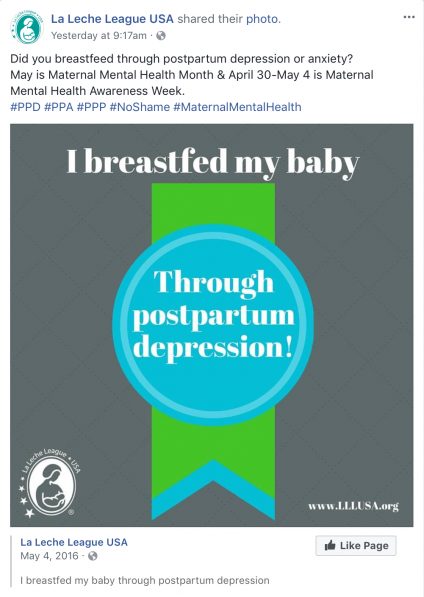
Have you no shame, La Leche League?
Once again you cruelly posted this “badge.”

I breastfed my baby through postpartum depression!
Never mind that women are literally killing themselves and their babies because of postpartum depression, and breastfeeding has been implicated in the suffering of these women:
[pullquote align=”right” cite=”” link=”” color=”” class=”” size=””]Do you make a stick-on version of the badge that undertakers can affix to the coffins of new mothers who commit suicide?[/pullquote]
Florence Leung killed herself in despair over breastfeeding difficulties.
Charlotte Bevan discontinued her anti-psychotic medication while still in the hospital because it was not compatible with breastfeeding. With her baby she went directly from the hospital to a gorge and jumped; both she and the baby died.
Mary Jo Trokey used a gun to kill her baby, her husband and herself. According to her mother:
A combination of stressful factors, especially breastfeeding and returning to work, “all compounded” and led up to the killings.
Inquiring minds want to know, La Leche League: do you make a stick-on version that the undertakers could have affixed to the coffins of these women?
But what’s more important than LLL continuing to profit from the business of breastfeeding? Certainly not women’s mental health, right?
It’s instructive to juxtapose LLL’s ugly indifference to the suffering of those struggling with postpartum depression to the response to a new movie depiction of postpartum depression:
“Tully,” a movie about motherhood starring Charlize Theron that doesn’t open until Friday, is already generating a heated conversation about its portrayal of postpartum depression, a subject rarely depicted onscreen.
Some women are upset by the film:
Ann Smith, the president of Postpartum Support International, a nonprofit group, said her organization has been fielding complaints about the film since March, when spoilers began to circulate…
“The mommy world is up in arms,” she said, referring to survivors of perinatal mood disorders, which are diagnosed in one out of every seven women during pregnancy or postpartum. “I can see why there’s a lot of anger out there, and I think they have a right to it.”
What bothered many survivors of postpartum depression is that the suffering mother never gets mental health treatment.
According to midwife Diana Spaulding writing for Mother.ly:
The reason that people are so excited about Tully is because they feel like it is the first time that true motherhood is being portrayed on the big screen—but this is not true motherhood. Motherhood is hard, yes, but it is not this. This is mental illness. Brushing aside her mental illness again refuses to give it the attention it deserves.
Marlo needs immediate mental health treatment, and there is no direct acknowledgment in the film that she is getting it. Yes, a doctor tells her husband that she has PPD. Perhaps we can assume that means she’s getting help?
Here’s the thing though—all too often in mental health we assume that someone is fine and getting the care they need. So we don’t do anything or say anything.
We need to create a culture that is done assuming and starts ensuring.
I don’t know about the movie because I haven’t seen it, but this incisive criticism makes a perfect rebuke to La Leche League.
Breastfeeding through mental illness is not something to celebrate with a badge. Postpartum depression is a form of mental illness and its sufferers need immediate treatment. Yes, the badge acknowledges the existence of PPD but it says nothing about appropriate care and treatment; indeed it sends the message that treatment is unimportant compared to continued breastfeeding.
LLL utterly ignores the fact that sometimes the best treatment for an individual woman involves stopping breastfeeding in order to get more rest or to be able to take antidepressant medications incompatible with breastfeeding. To those women the badge conveys the repugnant message that they are bad mothers at the exact moment they are struggling desperately to feel like good mothers.
It implies that the good mother is nothing more than a milk dispenser, not a valued person whose mental health takes priority over the trivial benefits that breastfeeding provides.
That message isn’t merely reprehensible; it could be deadly.

